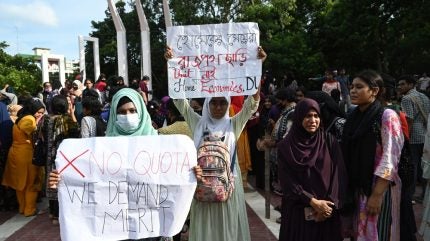
After Bangladesh’s prime minister Sheikh Hasina resigned, and fled the country, reports of turmoil at Bangladesh’s nationwide trade organisation for garment manufacturers, the BGMEA, have been circulating.
Stability should be on the horizon given Nobel laureate Muhammad Yunusis has now been sworn in as Bangladesh’s interim leader following the recent violent protests that resulted in 300 deaths.
What has happened at the BGMEA since the government left?
However, the BGMEA has claimed the recent political turbulence also led to a “hostile takeover attempt” of its board by “a group of members and unidentified individuals” on 7 August.
Prior to the alleged takeover attempt, local reports also suggest a number of BGMEA members called for the dissolution of the current board.
According to local news outlet the Financial Express the group of BGMEA members wrote a memorandum that expressed a lack of confidence in the existing board of directors.
The memorandum was submitted to BGMEA acting president Khandoker Rafiqul Islam during an emergency meeting that was held on 6 August.

US Tariffs are shifting - will you react or anticipate?
Don’t let policy changes catch you off guard. Stay proactive with real-time data and expert analysis.
By GlobalDataFormer BGMEA vice president Faisal Samad is said to have told local press: “In the context of change, the garment sector is facing multifaceted challenges. But the initiative of the BGMEA president was not seen to deal with these, because he was in the field with political programmes.
“This important sector of the economy is not important to him. At the same time, where he is at present, BGMEA members do not know.”
The BGMEA president is not currently in the country, however local news outlet The Business Standard says its BGMEA sources claim he is currently in Singapore with his son who is having hospital treatment.
In his absence, senior vice president Khandoker Rafiqul Islam is said to be serving as the acting president of the association.
The BGMEA had not responded to Just Style’s request for comment at the time of going to press.
How will BGMEA turmoil impact Bangladesh apparel sourcing on a global level?
Located in Bangladesh’s capital city, Dhaka, the BGMEA has always played a key role in the country’s foreign trade sector and worked closely with the government given Bangladesh is the third largest exporter of readymade garments globally, according to the Bangladesh Investment Development Authority.
Gherzi Textil Organization’s partner Bob Antoshak told Just Style exclusively the BGMEA plays a significant role in Bangladesh’s apparel sector. “Because of the scale of the industry in relation to the country’s overall economy, it also commands national importance.”
In this sense, he continues: “It’s unfortunate to see turmoil in the organisation while the country attempts to stabilise and calm down from its recent political unrest. At this point what’s most important for Bangladesh’s apparel industry is stability and a return to business as usual.”
Dr Sheng Lu, professor of apparel studies at the University of Delaware agrees, adding: “Studies repeatedly show that political instability in a country reduces its attractiveness as an apparel-sourcing destination. Any further drama in Bangladesh could only make US fashion companies even more cautious about sourcing from the country or have to take further measures to mitigate sourcing risks.”
He also points out June to September is usually Bangladesh’s peak season for apparel exports to the US market, adding additional pressure for a quick return to business as usual in the coming weeks.
How have fashion brands and retailers responded to the unrest?
Earlier this month, the BGMEA asked global apparel buyers to be sympathetic to its manufacturers as production was suspended during protests and unrest.
In a statement, Swedish retail giant H&M previously said that, as factories were gradually reopening in Bangladesh, safety remains a priority.
“We have expressed to our suppliers that we would not seek any discount due to delays that might happen under the current circumstances. We continue assessing the situation on daily basis,” the Swedish retailer said.
Meanwhile, a spokesperson for British retailer Primark told Just Style: “The widespread violence in Bangladesh is deeply concerning. We remain in close contact with our suppliers and colleagues based in the region to ensure those affected are fully supported. We will continue to work closely with our supplier partners as the situation evolves.”
What’s next for BGMEA and Bangladesh?
GlobalData retail analyst Neil Saunders tells Just Style the departure of prime minister Hasina had left “something of a vacuum” in the country. “The appointment of an interim leader may well help with this,” he adds.
However, he cautions: “Any new government will quickly need to get to grips with a slowing economy. Garment buyers want stability and certainty when doing business with Bangladesh and that has been absent for a while.”
After he was sworn in yesterday, Yunus reportedly told journalists that Bangladesh now has a “second independence” and called for the restoration of law and order.
After weeks of worrying scenes in Bangladesh, there is hope that a new government will restore peace to the region.
CEO of Bangladesh Denim Expo and Bangladesh Apparel Exchange and managing director of Denim Expert Ltd, Mostafiz Uddin remains confident that “brave Bangladesh will take the economy forward bravely and boldly.”
He told Just Style when the resignation of the prime minister was announced: “There has been instability for around three weeks. I will term this the win of the people. People from all walks of life came to the streets to celebrate the win of their protests.”



